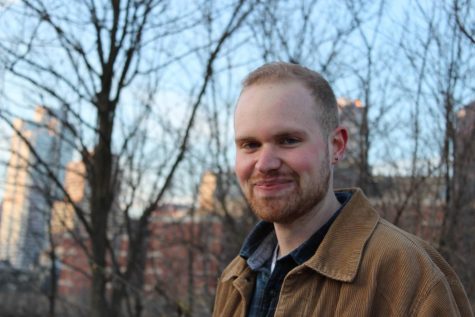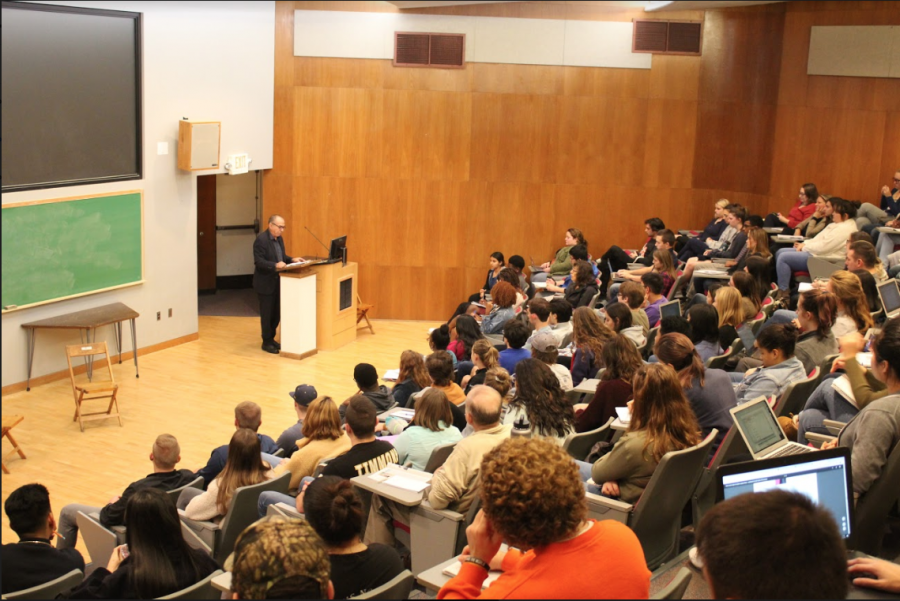Alfredo Corchado shares experiences from the Mexican border
Alfredo Corchado gives lecture on his experiences as a journalist at 7 pm on Oct. 25, 2019 in Quigley Auditorium.
Few students have the opportunity to speak at high profile events on campus, and even fewer have the opportunity to introduce their own, world-renowned relatives. Genesis Pena, ’22, however, was able to do just that.
“He’s a Mexico border correspondent for the Dallas Morning News, and he’s written two books, ‘Midnight to Mexico,’ and most recently, ‘Homelands,’” Pena said. “He’s a Nieman Fellow at Harvard, he’s been recognized by Columbia University with the Maria Moors Cabot Prize, which honors journalists who cover the Americas. He was also awarded by Colby College for courageous journalism. To me, he’s just my uncle. He is the guy who will take me to Starbucks to get me a pumpkin spice, to talk about my life, my dreams and my future.”
Pena welcomed her uncle, Alfredo Corchado, Mexico City bureau chief of the Dallas Morning News, to speak at the Gator Day eve keynote address, “The Great Mexican-American Migration” at 7 p.m. Monday, Oct. 28, in a packed Quigley Auditorium. The talk was co-sponsored by the Allegheny College Career Education Office and Law and Policy Program.
“I enjoy visiting colleges and universities because these are the places where you meet people from all over the world, you form friendships, you build bridges and when you leave, you spread the message that you don’t fear one another,” Corchado said. “This is where you learn about tolerance, something that I believe is sorely lacking today.”
As a resident of El Paso, Texas, where people are still reeling from the Aug. 3 mass shooting in a local Walmart, Corchado took a moment to remember the one-year anniversary of the Tree of Life Synagogue massacre in Pittsburgh. Corchado explained that El Paso has learned a lot about how to heal and grieve from Pittsburgh.
Corchado’s family immigrated to the United States when he was 6 years old. His mother and father worked the fields and were both members of the United Farm Workers Union. His family benefited from the Immigration-Nationality Act of 1965 signed by President Lyndon B. Johnson. This act repealed an earlier quota system based on national origin and was based on reuniting immigrant families and encouraging skilled laborers to come to the United States.
“Like my parents, I too came of age in the fields, in the biggest agricultural valley in the world, the San Joaquin Valley,” Corchado said. “I learned English by listening to songs by Michael Jackson and ‘I Think I Love You’ by the Partridge Family.”
Corchado dropped out of high school to work, and said at the time he did not understand why education was important.
“My mom, however, had other ideas,” Corchado said. “She said that she sacrificed everything she knew in Mexico for her sons. Quitting high school was not part of (her) plan (for me). She tried convincing me to go back to school. She even bribed me with the promise of a new car.”
At that time, Corchado’s dream was to own a 1977 Chevy Camaro.
“My mother’s eyes lit up,” Corchado said. “‘We will sign the paperwork so you can get that car, (she said). ‘But, you must do three things. One, you need to promise that you will leave California, because all you’ve seen here are farm workers and fields. Two, you must get an education. … Three, you must promise that you won’t get married until you get an education.”
At El Paso Community College, where he was trying to figure out his future, a counselor helped Corchado take an aptitude test. His results indicated curiosity, specifically in the areas of politics and geography. His counselor suggested becoming a foreign correspondent.
This instance reminded Corchado of when he had to pretend to be older while working in the fields to avoid getting in trouble with the union as he needed to be at least 15 to work. Wearing large clothes to hide his true age, Corchado was reminded by his mother to never tell anyone that he was only 13.
One day, a reporter came and asked, “How old are you?” to which Corchado responded, “13.”
“My mother looked at me and said, ‘we’re going to get deported,’” Corchado said. “Even though we had green cards, she was that afraid of the situation. I was very intrigued (after this) that anyone was curious enough to ask me about anything. Someone actually cared about how I felt, someone actually wanted to give me a voice. I was inspired by this thing called journalism, by this idea of bearing witness, of speaking truth to power, of holding the powerful accountable.”
Corchado began his career in journalism at his college newspaper, where he covered school events during the day and the U.S.-Mexico border at night.
“You would cover these massive movements, … I was literally on top of the world,” Corchado said. “I knew what I wanted to do with my life was to report. I wanted to shine the light on issues that matter for (the U.S. and Mexico), and maybe even build bridges of understanding. … I am not a complete human being without telling stories in each country.”
When he reported for The Wall Street Journal, Frank Allen, a former editor for the Journal, offered Corchado a job in Philadelphia. But Corchado was reluctant to accept it. He said that, while he tried to brush off the offer, his mother persisted that he took the job because his family had worked so hard in the fields for so long.
“(Allen) saw a change in America, in the need for a more diverse newsroom,” Corchado said. “He recruited me, a bilingual, bicultural reporter to go out and tell our story; the story of innocent people on both sides of the border.”
After accepting the job, Corchado began to call different people asking if they knew of any Mexicans in Philadelphia. This is where the inspiration for his 2018 book, “Homelands,” began.
“Homelands” tells the story of the great Mexican migration, where the Mexican population of the United States exploded from 700,000 people in the 1970s to more than 35 million today. It is a culmination of Corchado’s personal life blended with politics. The book tells the story of when Corchado was a young journalist at The Wall Street Journal. As a Mexican-American, he felt isolated in America. But he met two Mexicans and one Mexican-American at a restaurant called “Tequilas” in Philadelphia, where they continued to meet for three decades discussing their Mexican roots and challenges of living as Mexican-American in modern America.
Corchado then read an excerpt from “Homelands.”
“‘We were the sons of a failed and incomplete revolution in Mexico now living in Philadelphia, which was supposed to embody the best of a revolution and where the nation’s Founders drew up a constitution that would be the envy of the world for centuries over,’” Corchado read. “‘We were testing the tolerance of a city built in 1691 by William Penn, an aristocrat turned rabble-rouser who saw in his new landholdings a haven for refugees fleeing religious persecution and immigrants looking to reinvent themselves.’”
After reading the excerpt, Pena held a question and answer session with her uncle. She asked about the risks that forced Corchado to leave Mexico. Corchado replied that he went to Mexico to focus on the U.S.-Mexico relationship including immigration and NAFTA. Corchado never thought he would begin to cover drug trafficking, but that all changed with the violent killing and rapes of hundreds of women in Juárez since 1993.
In 2007, Corchado wrote a story about how drug cartels were meeting with the Mexican military and government officials.
“Nothing happened (when the story was released),” Corchado said. “And then a day later, the Mexican magazine picks up the story and features it prominently. Within minutes, I get a call from an FBI Agent who called me from the border and said … ‘Where are you?’ … He said, ‘I have information that the cartel is going to kill an American journalist within 24 hours, and I think it’s you. I would get out.’ I’m looking at the buildings outside (my apartment), and suddenly I feel like I’m falling.”
Corchado was supposed to go to a special dinner with colleagues to celebrate his Maria Moors Cabot Prize from Columbia University, but he wanted to cancel it due to the threat.
“My friend said, ‘no we need to get together, now more than ever,’” Corchado said. “‘If they’re going to go after you, they’re going to have to come for us. We need to have enough tequila, so we’ve got to get together.’”
The next day, a statement came from the U.S. Government saying that no one can make a threat against an American journalist.
“That was incredibly important that your own government will stand up for you,” Corchado said. “That also gave me a sense of responsibility because I thought, there are many places in Mexico where journalists are (threatened) by the cartel. As a journalist, you have a responsibility to go out and write and tell these stories, not because you’re more courageous than they are, but because you can.”
Corchado is based in Mexico City, but his apartment is under repairs from a 2017 earthquake. He has been all over the continent, but he has also covered Hungary and West Africa. As of late, Corchado spends his time on the road and in El Paso.
“Much of Latin America is on the border. There’s thousands of migrants from Central America but also Cuba and Africa, (all seeking) asylum,” Corchado said. “The measures like family separations, (the) return-to-Mexico policy that forces asylum seekers to wait south of the border, and nowadays, we’re seeing more and more people coming illegally as a result, and through much more dangerous routes, which means many more deaths along the border.”
Corchado said that the situation at the border leads to heated rhetoric as President Donald Trump and his supporters call for a border wall to be built along the U.S.-Mexico border.
Responding to a question about biases in the press, Corchado said that he, as any other human, is biased. As a reporter, he strives to present facts and allow people to realize the truth.
“I don’t pretend to be an unbiased reporter,” Corchado said. “I believe in justice. I also believe that we have to give as many people as possible a voice in a story and let the reader decide what’s truth.”
Jacqueline Reiser, ’22, asked whether Corchado would do anything other than journalism.
“I have no doubt about journalism,” Corchado said. “I think, if I did it all over again, I wouldn’t have dropped out of high school. It did take me awhile to catch up, … to grasp English, … not just speaking but also writing.”
When discussing with Pena about how Mexicans fit into the United States, Corchado brought up the El Paso shooting again. He said that it happened on his father’s birthday.
“If anyone believes in the American Dream … it is my father,” Corchado said. “This was very hurtful. … For many Mexicans, El Paso has always been a haven, a place to seek refuge. Every immigrant generation faces challenges. The only way they can respond is by participating.”

Ethan Woodfill is a senior from Pittsburgh, Pennsylvania. He is an Environmental Science & Sustainability and Political Science double major with an...








